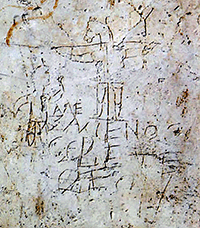Problems With Crucifixion of Jesus
A central statement in traditional Christian creeds is that Jesus was crucified “under Pontius Pilate.”
This phrase communicates some important specifics of that historical event. First, we learn that Jesus didn’t simply die, but that he was executed by the duly appointed governmental authority of Roman Judea. This means that Pilate found something so serious as to warrant the death penalty.
But this was also a particular kind of death penalty. Death by crucifixion was reserved for particular crimes and particular classes. Crucifixion was commonly regarded as not only frighteningly painful but also the most shameful of deaths. It was reserved for those perceived to be rebelling against Roman rule or who in some way seemed to challenge the social order.
It is clear that the Christian message that Jesus, as Son of God, was crucified, was troubling to both Jews and Gentiles. In his letter to the Galatians, Paul acknowledged that under the law of Moses, "cursed is every one that hangeth on a tree" (Galatians 3:13; Deuteronomy 21:22-23). Some people mocked Christians for worshiping a God who was crucified, one example being Cynic philosopher Lucian, who wrote a satire that mocked Christians who "have sinned by denying the Greek gods, and by worshiping that crucified sophist himself and living according to his laws." In the second century, Justin Martyr, a Christian apologist, acknowledged the charges, saying "It is for this that they charge us with madness, saying that we give the second place after the unchanging and ever-existing God and begetter of all things to a crucified man."

Roman-era writers considered crucifixion the worst imaginable fate, and a punishment of unspeakable shamefulness. Celsus, a Roman critic of Christianity, ridiculed Christians for treating someone who had been crucified as divine. A second-century anti-Christian graffito from Rome, well-known among historians, depicts a crudely drawn crucified man with a donkey’s head, under whom stands a human figure, and a derisive statement: "Alexamenos worships his god."
Christians clearly had little to gain by proclaiming a crucified Saviour. Some early followers even tried to avoid reference to Jesus’ crucifixion, or created other accounts. For example, in one Christian apocryphal text, the soldiers confuse a bystander with Jesus and crucify him instead. This idea appeared later in the Muslim tradition holding that a person from the crowd was mistakenly crucified as Jesus escaped, avoiding a shameful death.
Jesus’ crucifixion posed a variety of problems for early Christians. It revealed that at the heart of their faith was a state execution of their revered savior. It is this early criticism of Christianity, what the apostle Paul called "the offence of the cross," that he responded to as he emphasized its importance. He acknowledged this type of taunt...
"For the preaching of the cross is to them that perish foolishness; but unto us which are saved it is the power of God. . . . For the Jews require a sign, and the Greeks seek after wisdom: but we preach Christ crucified, unto the Jews a stumblingblock, and unto the Greeks foolishness"
1 Corinthians 18:22-23
Gentiles (Greeks) viewed a crucified Christ as foolishness simply because the worship of a powerless human, stripped of all dignity and executed, made no sense whatever. Their gods were vicarious, super-human types whose thoughts and activities mirrored the cravenness of humans, but on a grander scale.
For Jews, Jesus was a much more complex problem. The most common expectation of Jewish leaders was that the Messiah would come to restore the Kingdom of Israel, the Throne of David, and be a political victor, who would subjugate Israel and all nations on earth.
"May he rule from sea to sea and from the River to the ends of the earth. 9 May the desert tribes bow before him and his enemies lick the dust. 10 May the kings of Tarshish and of distant shores bring tribute to him. May the kings of Sheba and Seba present him gifts. 11 May all kings bow down to him and all nations serve him."
Psalm 72:8-11
Then Jesus, who proves himself by many miracles and is received into Jerusalem with shoutings of hosannah and jubilation as the Messianic King (Matthew 21:9), is crucified in front of them. He is defeated in the most disgraceful manner, destroying all their expectations. Finally, Jews also could not recognize Jesus as Messiah because of the view (from the Book of Deuteronomy and cited above) that he died in a manner indicating that he was cursed by God.

